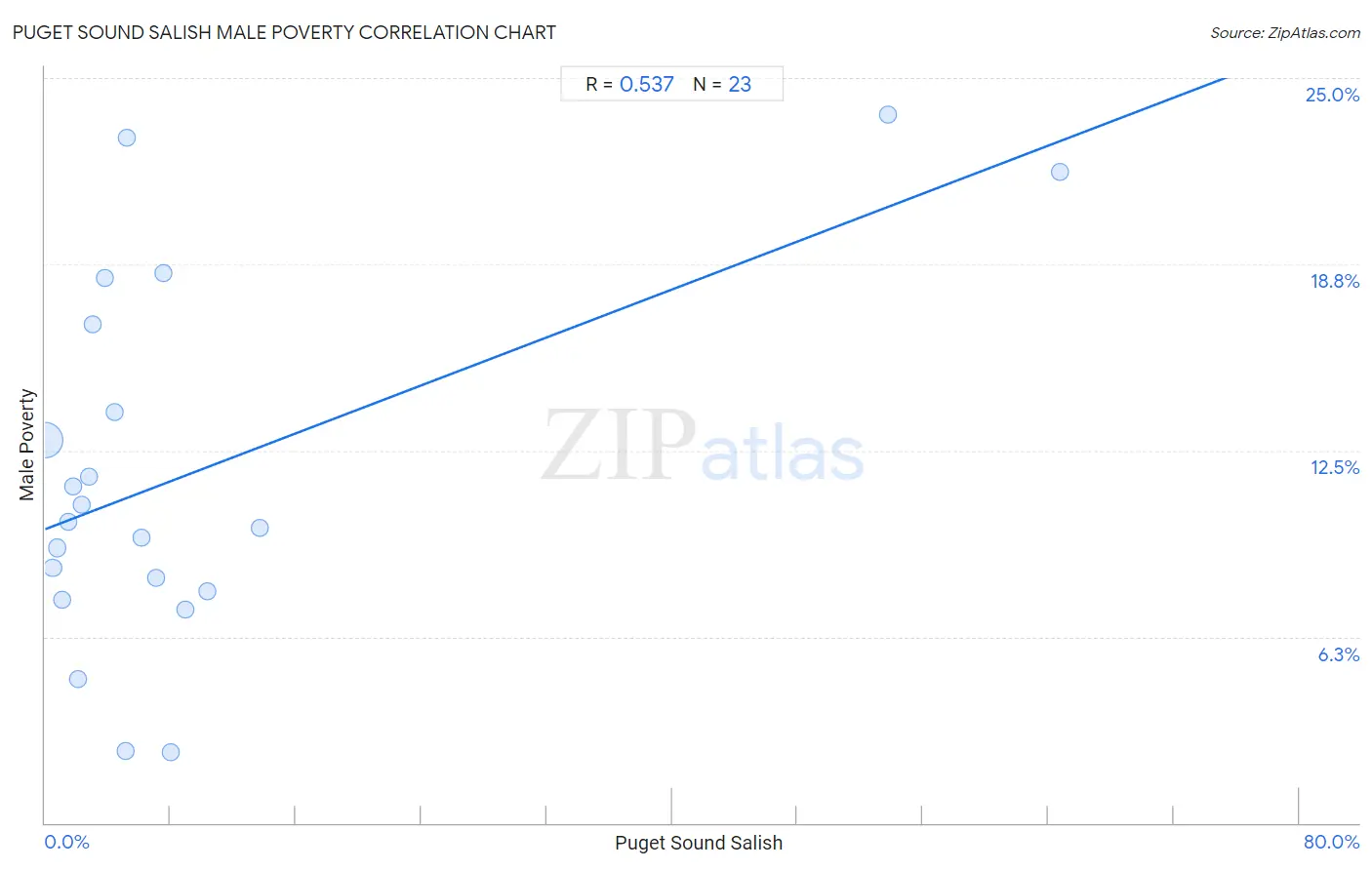Puget Sound Salish Male Poverty
COMPARE
Puget Sound Salish
Select to Compare
Male Poverty
Puget Sound Salish Male Poverty
10.7%
POVERTY | MALES
84.3/ 100
METRIC RATING
127th/ 347
METRIC RANK
Puget Sound Salish Male Poverty Correlation Chart
The statistical analysis conducted on geographies consisting of 46,147,564 people shows a substantial positive correlation between the proportion of Puget Sound Salish and poverty level among males in the United States with a correlation coefficient (R) of 0.537 and weighted average of 10.7%. On average, for every 1% (one percent) increase in Puget Sound Salish within a typical geography, there is an increase of 0.20% in poverty level among males.

It is essential to understand that the correlation between the percentage of Puget Sound Salish and poverty level among males does not imply a direct cause-and-effect relationship. It remains uncertain whether the presence of Puget Sound Salish influences an upward or downward trend in the level of poverty level among males within an area, or if Puget Sound Salish simply ended up residing in those areas with higher or lower levels of poverty level among males due to other factors.
Demographics Similar to Puget Sound Salish by Male Poverty
In terms of male poverty, the demographic groups most similar to Puget Sound Salish are Immigrants from Ukraine (10.7%, a difference of 0.0%), Immigrants from Western Europe (10.7%, a difference of 0.020%), Immigrants from Peru (10.7%, a difference of 0.030%), Chilean (10.7%, a difference of 0.070%), and Immigrants from Belarus (10.7%, a difference of 0.18%).
| Demographics | Rating | Rank | Male Poverty |
| Immigrants from China | 87.1 /100 | #120 | Excellent 10.7% |
| Peruvians | 87.1 /100 | #121 | Excellent 10.7% |
| Native Hawaiians | 87.0 /100 | #122 | Excellent 10.7% |
| South Africans | 86.8 /100 | #123 | Excellent 10.7% |
| French | 86.7 /100 | #124 | Excellent 10.7% |
| Immigrants from Norway | 86.0 /100 | #125 | Excellent 10.7% |
| Immigrants from Ukraine | 84.3 /100 | #126 | Excellent 10.7% |
| Puget Sound Salish | 84.3 /100 | #127 | Excellent 10.7% |
| Immigrants from Western Europe | 84.2 /100 | #128 | Excellent 10.7% |
| Immigrants from Peru | 84.1 /100 | #129 | Excellent 10.7% |
| Chileans | 83.9 /100 | #130 | Excellent 10.7% |
| Immigrants from Belarus | 83.3 /100 | #131 | Excellent 10.7% |
| Immigrants from Vietnam | 83.0 /100 | #132 | Excellent 10.8% |
| Pakistanis | 83.0 /100 | #133 | Excellent 10.8% |
| New Zealanders | 82.9 /100 | #134 | Excellent 10.8% |
Puget Sound Salish Male Poverty Correlation Summary
| Measurement | Puget Sound Salish Data | Male Poverty Data |
| Minimum | 0.031% | 2.4% |
| Maximum | 64.8% | 23.8% |
| Range | 64.7% | 21.4% |
| Mean | 9.3% | 11.7% |
| Median | 4.4% | 10.1% |
| Interquartile 25% (IQ1) | 1.8% | 7.8% |
| Interquartile 75% (IQ3) | 8.0% | 16.7% |
| Interquartile Range (IQR) | 6.2% | 9.0% |
| Standard Deviation (Sample) | 16.2% | 6.1% |
| Standard Deviation (Population) | 15.9% | 5.9% |
Correlation Details
| Puget Sound Salish Percentile | Sample Size | Male Poverty |
[ 0.0% - 0.5% ] 0.031% | 43,375,014 | 12.8% |
[ 0.0% - 0.5% ] 0.48% | 1,435,750 | 8.6% |
[ 0.5% - 1.0% ] 0.75% | 629,731 | 9.2% |
[ 1.0% - 1.5% ] 1.07% | 225,544 | 7.5% |
[ 1.5% - 2.0% ] 1.51% | 123,816 | 10.1% |
[ 1.5% - 2.0% ] 1.81% | 133,095 | 11.3% |
[ 2.0% - 2.5% ] 2.08% | 67,849 | 4.8% |
[ 2.0% - 2.5% ] 2.35% | 19,139 | 10.7% |
[ 2.5% - 3.0% ] 2.81% | 37,065 | 11.6% |
[ 3.0% - 3.5% ] 3.03% | 44,850 | 16.7% |
[ 3.5% - 4.0% ] 3.77% | 2,040 | 18.3% |
[ 4.0% - 4.5% ] 4.44% | 2,185 | 13.8% |
[ 5.0% - 5.5% ] 5.14% | 2,041 | 2.4% |
[ 5.0% - 5.5% ] 5.24% | 1,413 | 23.0% |
[ 6.0% - 6.5% ] 6.18% | 3,284 | 9.6% |
[ 7.0% - 7.5% ] 7.09% | 30,376 | 8.2% |
[ 7.5% - 8.0% ] 7.56% | 119 | 18.5% |
[ 8.0% - 8.5% ] 8.00% | 1,000 | 2.4% |
[ 8.5% - 9.0% ] 8.96% | 3,203 | 7.2% |
[ 10.0% - 10.5% ] 10.33% | 4,329 | 7.8% |
[ 13.5% - 14.0% ] 13.67% | 4,484 | 9.9% |
[ 53.5% - 54.0% ] 53.79% | 593 | 23.8% |
[ 64.5% - 65.0% ] 64.75% | 644 | 21.8% |